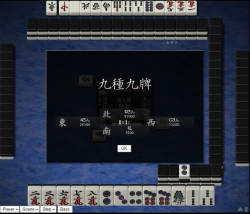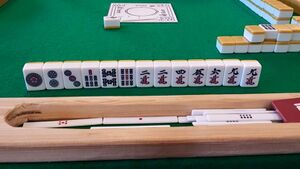Daburu riichi: Difference between revisions
No edit summary |
|||
| (2 intermediate revisions by one other user not shown) | |||
| Line 10: | Line 10: | ||
* [http://tenhou.net/0/?log=2016072423gm-00a9-0000-b0aed9e0&ts=8&tw=2 Double riichi denied] | * [http://tenhou.net/0/?log=2016072423gm-00a9-0000-b0aed9e0&ts=8&tw=2 Double riichi denied] | ||
}} | }} | ||
'''Daburu riichi''' {{kana|両立直}} or {{kana|ダブルリーチ}}, or simply '''double riichi''', is a special case for [[riichi]] on the first turn. Specifically, if the player reaches [[tenpai]] before their first discard (i.e., within the first 14 tiles), and before anyone has made a [[tile call]], then riichi will automatically be converted into double riichi. Double riichi is worth 2 han | '''Daburu riichi''' {{kana|両立直}} or {{kana|ダブルリーチ}}, or simply '''double riichi''', is a special case for [[riichi]] on the first turn. Specifically, if the player reaches [[tenpai]] before their first discard (i.e., within the first 14 tiles), and before anyone has made a [[tile call]], then riichi will automatically be converted into double riichi. Double riichi is worth 2 han, 1 more than the usual 1 han for riichi. | ||
As with regular riichi, double riichi is not mandatory, but rarely do players decline an opportunity for it. In addition to the added han, a double riichi hand is inherently much faster than the average hand. | As with regular riichi, double riichi is not mandatory, but rarely do players decline an opportunity for it. In addition to the added han, a double riichi hand is inherently much faster than the average hand. | ||
| Line 17: | Line 17: | ||
Double riichi is not possible when anyone makes a tile call before the riichi call, even if you reach tenpai on your first turn. Therefore, [[kan]], even the player's own closed kan, will deny this yaku. In [[sanma]], [[kita]] calls will also deny this yaku. | Double riichi is not possible when anyone makes a tile call before the riichi call, even if you reach tenpai on your first turn. Therefore, [[kan]], even the player's own closed kan, will deny this yaku. In [[sanma]], [[kita]] calls will also deny this yaku. | ||
== Tenhou and | == Tenhou and Chiihou == | ||
{{main|Tenhou and chiihou}} | {{main|Tenhou and chiihou}} | ||
If a hand qualifies for [[Tenhou and chiihou|tenhou/chiihou]], it is still possible to declare double riichi. However, this would be a blunder, as it means giving up the yakuman (and entering [[furiten]]). For this reason, it is unwise to call double riichi before checking if the starting hand qualifies for a win. | |||
== Compatibility == | == Compatibility == | ||
| Line 36: | Line 36: | ||
== Defending against double riichi == | == Defending against double riichi == | ||
[[Image:Double riichi denied.png|thumb|right|250px|[http://tenhou.net/0/?log=2016032809gm-0089-0000-19c59dbd&tw=1&ts=7 Double riichi] stopped by [[kyuushu kyuuhai]].]] | [[Image:Double riichi denied.png|thumb|right|250px|[http://tenhou.net/0/?log=2016032809gm-0089-0000-19c59dbd&tw=1&ts=7 Double riichi] stopped by [[kyuushu kyuuhai]].]] | ||
Double riichi's greatest advantage, other than its speed, is that it is difficult to defend against. When double riichi is declared, there will be almost no information in the [[discard pile]] to work with, leaving little/no safe tiles for [[defense]]. | |||
* If you have nothing better, [[honor]] tiles are the safest to discard. Since honors cannot form [[sequence|sequences]], it is less likely for an opponent to wait on one. The honor tile with the most visible copies is the safest; a [[yakuhai]] you can see two of is safer than a [[jikaze|guest wind]] you can see one of. If you can see an equal number of a yakuhai tile and a guest wind tile, choose the guest wind. | |||
* [[Suji]] is less effective. A player declaring double riichi is unable to choose to have a [[ryanmen]] wait. Since suji relies on the opponent having a ryanmen, it is less likely to help. | |||
After a few discards | After a few turns, the player's discards will reveal some safe tiles. Due to the rules of riichi [[furiten]], any tile any player had discarded after a riichi is 100% safe against the riichi declarer. Therefore, safe tiles will rack up quickly. Eventually, players may reach tenpai and win for themselves. | ||
The threat of double riichi can also be ended via | The threat of double riichi can also be ended via [[Tochuu ryuukyoku|abortive draw]]. [[Kyuushu kyuuhai]] can immediately end the hand before the declarer can claim tsumo, as can suufon renta. The other types of draw (suukaikan, suucha riichi, sanchahou) are usually too dangerous to rely on, but they can get you out of the hand. | ||
== External links == | == External links == | ||
Latest revision as of 15:18, 18 September 2024
| Type | Yaku |
|---|---|
| Kanji | 両立直 or ダブルリーチ |
| English | Double ready |
| Value | 2 han |
| Speed | Immediate |
| Difficulty | At discretion |
Daburu riichi 「両立直」 or 「ダブルリーチ」, or simply double riichi, is a special case for riichi on the first turn. Specifically, if the player reaches tenpai before their first discard (i.e., within the first 14 tiles), and before anyone has made a tile call, then riichi will automatically be converted into double riichi. Double riichi is worth 2 han, 1 more than the usual 1 han for riichi.
As with regular riichi, double riichi is not mandatory, but rarely do players decline an opportunity for it. In addition to the added han, a double riichi hand is inherently much faster than the average hand.
Cancellation
Double riichi is not possible when anyone makes a tile call before the riichi call, even if you reach tenpai on your first turn. Therefore, kan, even the player's own closed kan, will deny this yaku. In sanma, kita calls will also deny this yaku.
Tenhou and Chiihou
If a hand qualifies for tenhou/chiihou, it is still possible to declare double riichi. However, this would be a blunder, as it means giving up the yakuman (and entering furiten). For this reason, it is unwise to call double riichi before checking if the starting hand qualifies for a win.
Compatibility
^ Ippatsu requires riichi to be of any use.
| RCH | DRI | IPP | SMO | TAN | PFU | IPK | ITT | YAK | SDJ | SDO | TOI | SNA | SNK | CHA | JUN | RPK | SSG | HRO | HON | CHN | CHI | RIN | HAI | HOU | CHK | |
| RCH | ||||||||||||||||||||||||||
| DRI |
Double riichi has the same compatibility as riichi, except for chankan. This is because, for a regular hand, chankan may only be formed from an added kan, which itself requires a call for pon to happen first.
- If the pon call happens before the riichi call, then double riichi is negated.
- If the pon call happens after the riichi call, then the double riichi player must have declined their winning tile, invoking furiten. Chankan can only be won from ron, so furiten prevents chankan entirely.
An exception is the yakuman kokushi musou. Depending on rule variation, kokushi may be won off a closed kan, which does not require a previous pon call. Therefore, in order to win with double riichi + chankan, it must also have kokushi. Since this would be a yakuman hand, the yaku of "chankan" is never actually scored.
Defending against double riichi

Double riichi's greatest advantage, other than its speed, is that it is difficult to defend against. When double riichi is declared, there will be almost no information in the discard pile to work with, leaving little/no safe tiles for defense.
- If you have nothing better, honor tiles are the safest to discard. Since honors cannot form sequences, it is less likely for an opponent to wait on one. The honor tile with the most visible copies is the safest; a yakuhai you can see two of is safer than a guest wind you can see one of. If you can see an equal number of a yakuhai tile and a guest wind tile, choose the guest wind.
- Suji is less effective. A player declaring double riichi is unable to choose to have a ryanmen wait. Since suji relies on the opponent having a ryanmen, it is less likely to help.
After a few turns, the player's discards will reveal some safe tiles. Due to the rules of riichi furiten, any tile any player had discarded after a riichi is 100% safe against the riichi declarer. Therefore, safe tiles will rack up quickly. Eventually, players may reach tenpai and win for themselves.
The threat of double riichi can also be ended via abortive draw. Kyuushu kyuuhai can immediately end the hand before the declarer can claim tsumo, as can suufon renta. The other types of draw (suukaikan, suucha riichi, sanchahou) are usually too dangerous to rely on, but they can get you out of the hand.
External links

- Daburu riichi in Japanese Wikipedia
| |||||||||||||||||||||||||||||||
